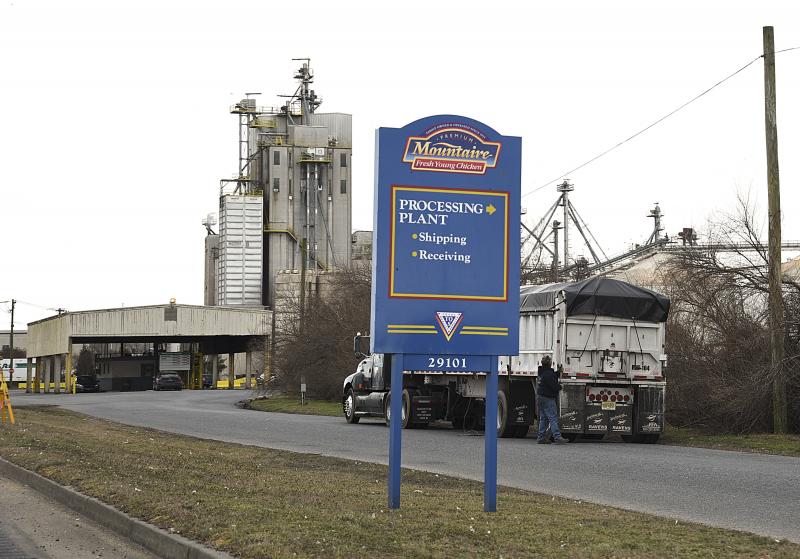Chicken plants battle to balance food supply, worker safety
Chicken plants on Delmarva are on the frontlines of the COVID-19 crisis, and as the country enters a second month of sheltering in place, concerns have been raised nationwide about the stability of the food supply in the face of rising coronavirus among poultry workers.
While the problem around the food supply chain and workers contracting COVID-19 have been a concern around the country, so far in the Delmarva area, plants are operating as normal.
At least three positive cases of COVID-19 have been reported at Delmarva area plants: two at Perdue’s Milford plant and one at Mountaire’s Selbyville plant. Allen Harim has not reported a positive case, but the company sent a letter to growers that flocks would be killed because the number of workers at its plants had fallen. Tyson Foods is still running its Temperanceville, Va. plant - the company’s lone Delmarva plant - but Tyson has had hundreds of employees test positive at other facilities around the country, including 900 at a pork processing plant in Indiana.
The situation at meat, pork and poultry processing plants has become serious enough that Tyson’s chairman, John Tyson, released a letter to the New York Times warning that the food supply chain was breaking. On April 28, President Donald Trump released an executive order keeping meat and poultry plants open, leaving implementation to the U.S. Department of Agriculture.
“Such closures threaten the continued functioning of the national meat and poultry supply chain, undermining critical infrastructure during the national emergency. Given the high volume of meat and poultry processed by many facilities, any unnecessary closures can quickly have a large effect on the food supply chain,” Trump’s order says.
In a statement on Trump’s order, Delmarva Poultry Industry Inc., an industry advocacy group, said, “This crisis is sorely testing Delmarva’s chicken community - our more than 20,000 chicken company employees, the more than 1,300 farmers who raise chickens here, and the scores of allied businesses we rely on. All of them have shown astounding reserves of patience, determination and strength. Together, and with a helping hand from the states and federal government, we will continue to feed the country and the world.”
Diana Souder, spokeswoman for Perdue, said, “Despite the global disruptions caused by COVID-19, we are still able to safely operate all of our facilities and have not had to shut down any of our plants. As we continue to do everything we can to protect and support our associates and local communities, we are proud to partner with federal, state, and local health experts, including the Centers for Disease Control, to conduct testing.”
Stacey Hofmann, spokeswoman for the Delaware Department of Agriculture, said the industry is partnering with local hospitals and the state’s Division of Public Health to offer free, rapid COVID-19 testing on-site.
“Testing is not mandatory; however, we have seen an increase of coronavirus disease cases in the area, and we want to make sure that employees and their families get all the information they need in order to be safe and healthy,” she said.
Hofmann said the Department of Agriculture, Division of Public Health and Delaware Emergency Management Agency have been working with industry representatives to ensure they have adequate infection control measures in place, including implementing physical barriers and social distancing protocols, daily health screenings and additional cleanings.
While she would not say how many workers at chicken plants have tested positive, Hofmann said during two testing events in Sussex County at the end of April, more than 35 percent of those tested were positive.
“We do not want to point the finger at any one location or business. Instead, we want to understand more clearly the nature of spread in the community which we are sure exists,” she said. “It's challenging to draw a cause-and-effect relationship in real time, so we are still actively evaluating the situation.”
She said the CDC has brought in a team of specialists and epidemiologists to help local officials understand the extent of the spread of COVID-19 in Sussex County, identify transmission routes, and provide recommendations to mitigate the spread.
While the plants have taken measures to protect their workers, representatives from United Food and Commercial Workers Local 27, which represents 2,000 food processing workers in Delaware, sent a letter to Gov. John Carney calling on him to enforce social distancing measures and rapid testing at the plants. The union asks for all plant workers to be provided with N-95 respirator masks at the beginning of every shift.
“Our members in meatpacking and poultry plants are on the front lines of a global pandemic that threatens our nation’s food supply,” said Local 27 President Jason Chorpenning. “These workers are putting their lives on the line every day to keep our country fed during this deadly outbreak and they must be protected. President Trump’s executive order now mandates that they continue to do so, without any language that ensures their safety.
“Here’s the bottom line: the best way to protect America’s food supply and to keep these plants open is to protect workers.”
As for potential food shortages, Hofmann said the impact of COVID-19 will have a trickle-down effect into all aspects of the state’s food economy, from dairy to egg production to specialty crops.
“We have seen a huge change in the past two months that have impacted consumer decisions. No longer can you go dine in a restaurant, your children are no longer eating at school every day, and families need more food available at home,” she said. “There is plenty of food, it just might not have gotten to the shelf yet. We are experiencing a huge change in how food is being processed and distributed across the country. You cannot shut down a production line for one type of food – for example a carton of milk used in school lunches – and expect it to get up and running to increase production for a gallon of milk to go into a grocery store. What you need for your family is totally different from what restaurants and schools need that was produced in bulk. Processors are working on making those changes, but it cannot happen overnight.”
Hofmann recommended people only shop for what they need, and to select alternatives and utilize Delaware farmers, many of whom have set up online ordering, curbside pick-up and drive-thru shopping. She said people can use the website DelawareGrown.com to find farmers in their area who may have products available.
“You can help keep the supply chain moving by creating demand. People should continue to consistently purchase the food that they need, but should not engage in panic buying,” Hofmann said.
Ryan Mavity covers Milton and the court system. He is married to Rachel Swick Mavity and has two kids, Alex and Jane. Ryan started with the Cape Gazette all the way back in February 2007, previously covering the City of Rehoboth Beach. A native of Easton, Md. and graduate of Towson University, Ryan enjoys watching the Baltimore Ravens, Washington Capitals and Baltimore Orioles in his spare time.






















































